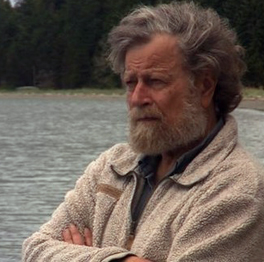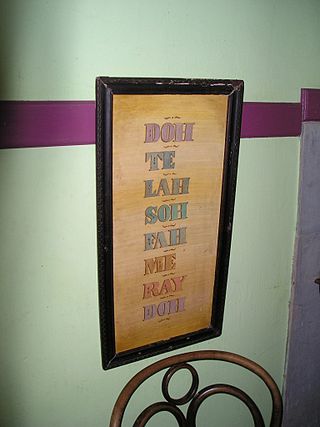In music, solfège or solfeggio, also called sol-fa, solfa, solfeo, among many names, is a music education method used to teach aural skills, pitch and sight-reading of Western music. Solfège is a form of solmization, though the two terms are sometimes used interchangeably.

Morten Johannes Lauridsen is an American composer. A National Medal of Arts recipient (2007), he was composer-in-residence of the Los Angeles Master Chorale from 1994 to 2001, and is the distinguished professor emeritus of composition at the University of Southern California Thornton School of Music, where he taught for fifty-two years until his retirement in 2019.

The Dale Warland Singers (DWS) was a 40-voice professional chorus based in St. Paul, Minnesota, founded in 1972 by Dale Warland and disbanded in 2004. They performed a wide variety of choral repertoire but specialized in 20th-century music and commissioned American composers extensively. In terms of sound, the DWS was known for its purity of tone, intonation, legato sound and stylistic range. During their existence, the DWS performed roughly 400 concerts and recorded 29 CDs.
Michael Shani is a well-known figure in the Israeli musical scene. He was born and raised in Israel, where he began his musical career as a cellist. He played in the Kibbutz Chamber Orchestra and was the conductor of the Kibbutz Symphony Orchestra. He completed his musical training at the Tel-Aviv Music Teacher's College, the Rubin Academy of Music in Jerusalem and at the Brigham Young University in Utah, United States.

Kirke Mechem is an American composer. His first opera, Tartuffe, with over 450 performances in nine countries, has become one of the most popular operas written by an American. He has composed more than 250 works in almost every form. In 2002, ASCAP registered performances of his music in 42 countries. He has been called the "dean of American choral composers". His memoir, Believe Your Ears: Life of a Lyric Composer, was published by Rowman & Littlefield in 2015; it won ASCAP Foundation's 48th annual Deems Taylor/Virgil Thomson Award for outstanding musical biography.
The Kodály method, also referred to as the Kodály concept, is an approach to music education developed in Hungary during the mid-twentieth century by Zoltán Kodály. His philosophy of education served as inspiration for the method, which was then developed over a number of years by his associates. In 2016, the method was inscribed as a UNESCO Intangible Cultural Heritage.
Suvini Zerboni (ESZ) Italian music publishing house founded in 1907 in Milan, taking its name from the theater society of the same name. The ESZ catalogue included, besides operetta favourites, the best of Italian contemporary music, such composers as Goffredo Petrassi, Luigi Dallapiccola, Luciano Berio, Ildebrando Pizzetti, and Gian Francesco Malipiero. Since the 1950s, ESZ has been the Italian agent of Schott Music, representing composers such as Igor Stravinsky, Carl Orff, Paul Hindemith, Richard Strauss, Luigi Nono, Krzysztof Penderecki, Joaquín Rodrigo and Alessandro Solbiati. The ESZ catalalogue of modern Italian composers active since the 1970s is extensive. ESZ also publishes the bulletin “ESZ News” with information on the activities and performances of its composers. Until 1999 ESZ published Il Fronimo, the guitar magazine founded by Ruggero Chiesa in 1972, and La Cartellina, a magazine on choral and pedagogical music, founded by Roberto Goitre in 1977 and subsequently headed by Giovanni Acciai.
Susan Elizabeth Digby, Baroness Eatwell OBE, known as Suzi Digby, is a British choral conductor and music educator.

Tonic sol-fa is a pedagogical technique for teaching sight-singing, invented by Sarah Ann Glover (1785–1867) of Norwich, England and popularised by John Curwen, who adapted it from a number of earlier musical systems. It uses a system of musical notation based on movable do solfège, whereby every note is given a name according to its relationship with other notes in the key: the usual staff notation is replaced with anglicized solfège syllables or their abbreviations. "Do" is chosen to be the tonic of whatever key is being used. The original solfège sequence started with "Ut", the first syllable of the hymn Ut queant laxis, which later became "Do".
Arpad Darazs was a Hungarian-American music educator who was widely known as one of the few in the Western hemisphere as an authority on the Kodály method of choral instruction.
Ernest Victor Llewellyn CBE was an Australian violinist, concertmaster, violist, conductor and musical administrator. He was the founding director of the Canberra School of Music and is commemorated by Llewellyn Hall, the concert venue at the School.
Oriol Martorell i Codina was a musical director, pedagogue and professor of history. He was the son of Artur Martorell i Bisbal, also a renowned pedagogue. While studying music he gained a doctorate in History.
Professor Géza Ellák Jenő Szilvay is a Hungarian violinist, teacher and conductor. He is the brother of the cellist Csaba Szilvay and the father of the violinist Réka Szilvay. With his brother Csaba Szilvay he founded the Helsinki Strings, a youth orchestra, in 1972. They conducted it until they retired in 2010.

Ana María Raga is a Venezuelan musician, choir and orchestra director, pianist, arranger, composer and teacher. She has won national and international prizes in the field of choral singing. She is the founder and president of the Aequalis Foundation.
Erwin Lendvai was a Hungarian composer and choral conductor. He was an uncle of the composer Kamilló Lendvay.
Hanus Aldo Schimmerling (1900–1967), pianist, composer, teacher, musicologist, and writer, known professionally as Hanns Aldo Schimmerling, was born to Hugo Schimmerling, a dentist, and Eugenie (Jennie) Grossman in Brno, the capital of Moravia in the Czech Republic. Both parents, in their sixties, fell victims to the Holocaust in 1944.
Mario Pigazzini is the current director of the Coro Polifonico Farnesiano, in Piacenza, Italy. He took over the reins of the choir in 1981, following the untimely death of Roberto Goitre the previous year. Pigazzini had been taught by Goitre and, since his appointment as director, has been using and developing Goitre's teaching method, called "Cantar Leggendo", which is similar to the Kodály Method.
Joel Magus P. Navarro is a Filipino-American conductor and music educator. He is one of the Philippines' most esteemed choral conductors. He is also a composer, singer, arranger, choral clinician, writer, producer, music minister, author, and book editor.
The International Kodály Seminar was named after the famous Hungarian musician, Zoltán Kodály, who was a composer, pedagogue, ethnomusicologist. He is well-known around the world as the creator of a music method: Kodály method. Foreign musicians from all over the world come to see his birthplace, Kecskemét to get some inspiration, learn his method for a better pedagogy and listen to Hungarian choirs and concerts. These are the main points for musicians to visit Kecskemét, Bács-Kiskun county.

Violeta Hemsy de Gainza was an Argentine pianist and music pedagogue. She focused on the music education of children, improvisation and music therapy, considering learning music a human right. Her books were translated into many languages. She served in international organisations, as a board member of the International Society for Music Education from 1985 to 1990, and as president of the Latin American Forum of Musical Education from its foundation in 1995 to 2005.






